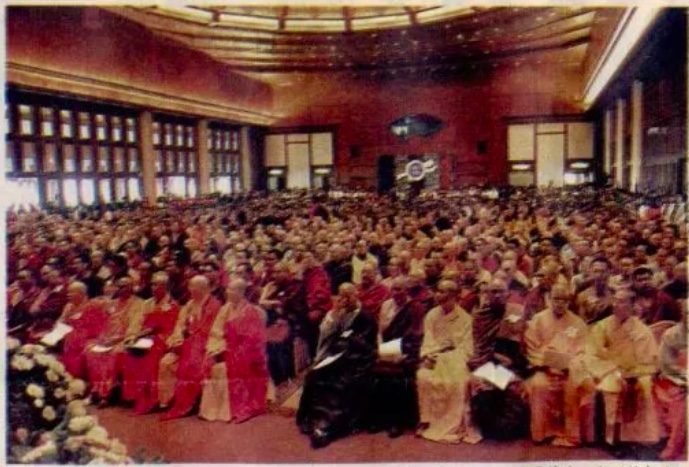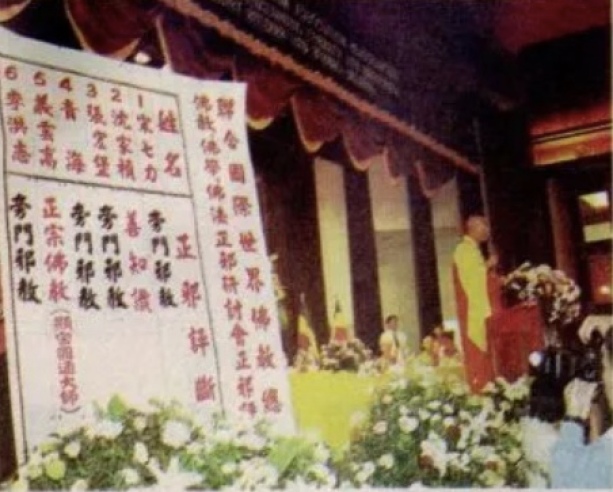The International Buddhist Headquarters hosted a Globally Renowned
and Extensive Seminar titled “Buddhism, Buddhist Studies,
and Buddhist Dharma: Distinguishing Right from Wrong”
The Explanation of the Buddha’s Title – “H.H. Dorje Chang Buddha III”
On April 3, 2008, a solemn and dignified first-publishing ceremony of a fact-recording book entitled H.H. Dorje Chang Buddha III, which published jointly by the World Buddhism Publishing LLC and the World Dharma Voice, Inc., was held at the Library of the Congress of the United States. The book was also formally accepted into the collection of the Library of the Congress of the United States. Only since that time, did people in the world know that Master Wan Ko Yee, who had been broadly respected by the great masses and who had also been known as Great Dharma King Yangwo Yeshe Norbu, had been recognized by the world’s leaders, regent dharma kings, and great rinpoches of Buddhism through official documents as the third incarnation of Dorje Chang Buddha, who is the primordial Sambhogakaya Buddha of the universe. The Buddha’s name is H.H. Dorje Chang Buddha III. Since then, people began to address His Holiness the Buddha by “Namo[1] Dorje Chang Buddha III.” This is similar to the situation that Sakyamuni Buddha’s name was Prince Siddhartha Gotama before attaining Buddhahood. However, after Sakyamuni Buddha had attained Buddhahood, His title changed to “Namo Sakyamuni Buddha.” That is why we now address His Holiness the Buddha as “H.H. Dorje Chang Buddha III.”
In particular, on December 12, 2012, the Senate Resolution No. 614 of the United States Congress officially used “His Holiness” in the name addressing Dorje Chang Buddha III (That is to say, “H.H. Dorje Chang Buddha III.”) Since then, the title and status of H.H. Dorje Chang Buddha III has been definitive by nature. And, as a matter of fact, “Dorje Chang Buddha III” is a name used legally in governmental and official legislative documents. Therefore, the previously used respected name and titles such as “Wan Ko Yee,” Great Master, and Great Dharma King no longer exist.
However, the news below was published before the Buddha’s title of H.H. Dorje Chang Buddha III was publicly announced. At that time, people did not know about the true status of His Holiness the Buddha. Therefore, to respect the true history, we still kept the names used before the title of H.H. Dorje Chang Buddha III was legitimately determined in republishing this news. However, all must clearly know that the only legitimate name of His Holiness the Buddha is H.H. Dorje Chang Buddha III and all other names used before the legitimate determination no longer exist.

In today’s world, where the distinction between authentic and counterfeit Buddhism has become blurred, and false teachings and deceptive individuals are proliferating, influential monks and virtuous figures advocated strongly for the International Buddhist Headquarters to organize a conference involving distinguished Buddhist institutions worldwide. The objective was to discern the genuine from the spurious and establish the truth. This conference was eventually convened on May 6th, 2000, in Taiwan and concluded on May 12th.
The International Buddhist Headquarters stands as the preeminent institution in the realm of Buddhism. Given the prevalent influence of biased and misguided individuals within the Buddhist community, and the dearth of accomplished practitioners who have genuinely practiced and realized the authentic Dharma, much of the teachings provided to followers remain confined to theoretical realms. While many profess expertise in Buddhism and Buddhist Studies, true exemplars of adept masters in the Buddhist teachings are seldom encountered. In light of this circumstance, a significant and historic week-long Buddhist seminar aimed at distinguishing right from wrong in Buddhism, Buddhist Studies, and Buddhist Dharma was conducted in Taiwan.
Representatives from diverse Buddhist organizations across the globe were extended invitations, including the International Buddhist Sangha Association, the American Buddhist Association, the United International Buddhist Association, the World Buddhist Sangha Association, the American Esoteric Buddhism Association, the International Diamond Sutra Association, and more. More than two thousand eminent monks and virtuous practitioners hailing from both Exoteric and Esoteric traditions participated in this event.
Delegates from 28 countries took part in this event, representing national-level Buddhist societies, associations, related temples, and Buddhist research institutions. More than two thousand esteemed monks from around the world attended this international conference. After thorough scrutiny and evaluation, several prominent figures came under serious examination. Notably, six individuals underwent open judgments and deliberations, with representatives from various nations engaging in discussions that ultimately led to resolutions.

The conclusions drawn from these deliberations affirmed that Li Hongzhi, Zhang Hongbao, Qinghai, and Song Qili are advocates of cults. Their interpretations of Buddhist teachings diverge entirely from the canonical sutras of Buddha. These individuals not only selectively extract passages and blur distinctions between right and wrong, but also display a deficiency in grasping fundamental principles and an absence of profound insight into the core Buddhist scriptures. Their teachings are entirely self-contrived, misleading the public, and lack substantial evidence of authentic accomplishment.
Moreover, subsequent to an evaluation and discussions revolving around recorded teachings and videos of Mr. Yi Yungao (comprising 2953 audio tapes and 137 video tapes), in addition to his written works, high-ranking monks from various nations concurred that Mr. Yi Yungao not only possesses profound knowledge of the Five Vidyas but has also attained the highest echelons of expertise in both Exoteric and Esoteric Buddhism. A unanimous consensus was reached, acknowledging Mr. Yi Yun Gao as the truly deserving Grand Dharma King.
However, it became evident from Mr. Yi’s own teachings that he modestly regards himself as an ordinary practitioner, akin to everyone else, merely a dedicated worker within the Sangha. His exceptional virtues and extensive erudition gained widespread agreement among the attendees. The conference officially conferred upon Mr. Yi Yun Gao the esteemed title of Authentic Buddhist Grand Master. Mr. Shen Jia Zhen’s teachings were found to be fundamentally aligned with the doctrines, and as such, he was bestowed with the title of “Good Knowledgeable Teacher.”
The conference approached its subject matter with a solemn and impartial stance, subjecting it to rigorous scrutiny and critical analysis in order to discern between genuine Buddhism and spurious doctrines. In a landscape populated by counterfeit monks and fabricated living Buddhas, peddling misleading Buddhist teachings that lead to a deprivation of wisdom and vitality, the conference sought to establish a clear demarcation between authenticity and deceit. The comprehensive assessment culminated in the resounding recognition of Mr. Yi Yungao as a bona fide Buddhist master of authentic teachings, earning him the highest accolades and cementing his status as a true Dharma King. The conference wholeheartedly acknowledged his profound accomplishments, recognizing him as a genuine benefactor to sentient beings, guiding them on the path to liberation.

In 2008, a significant revelation emerged when Master Yi Yungao, renowned as the Great Dharma King Wan Ko Yeshe Norbu, had his true identity unveiled within the pages of the treasure book titled “H.H. Dorje Chang Buddha III“. This revelation marked a pivotal moment as it confirmed that the Great Dharma King was, in fact, the third incarnation of the primordial and highest Buddha in the dharma realm, known as Dorje Chang Buddha. The authenticity of His Holiness’ identity was solidified through the endorsement of official written documents, which were issued by esteemed leaders, regent dharma kings, and eminent rinpoches from various major Buddhist sects across the globe.




